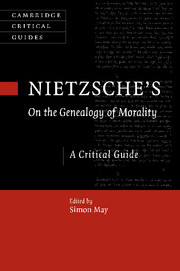Book contents
- Frontmatter
- Contents
- Contributors
- Acknowledgements
- Note on texts, translations, and references
- Introduction
- Chapter 1 The future of evil
- Chapter 2 On the nobility of Nietzsche’s priests
- Chapter 3 The genealogy of guilt
- Chapter 4 Why Nietzsche is still in the morality game
- Chapter 5 Who is the “sovereign individual”? Nietzsche on freedom
- Chapter 6 Ressentiment and morality
- Chapter 7 The role of life in the Genealogy
- Chapter 8 The relevance of history for moral philosophy
- Chapter 9 Why would master morality surrender its power?
- Chapter 10 “Genealogy” and the Genealogy
- Chapter 11 The promising animal
- Chapter 12 Nietzsche and the “aesthetics of character”
- Chapter 13 Nietzsche and the virtues of mature egoism
- Chapter 14 Une promesse de bonheur? Beauty in the Genealogy
- Bibliography
- Index
Chapter 10 - “Genealogy” and the Genealogy
Published online by Cambridge University Press: 05 November 2011
- Frontmatter
- Contents
- Contributors
- Acknowledgements
- Note on texts, translations, and references
- Introduction
- Chapter 1 The future of evil
- Chapter 2 On the nobility of Nietzsche’s priests
- Chapter 3 The genealogy of guilt
- Chapter 4 Why Nietzsche is still in the morality game
- Chapter 5 Who is the “sovereign individual”? Nietzsche on freedom
- Chapter 6 Ressentiment and morality
- Chapter 7 The role of life in the Genealogy
- Chapter 8 The relevance of history for moral philosophy
- Chapter 9 Why would master morality surrender its power?
- Chapter 10 “Genealogy” and the Genealogy
- Chapter 11 The promising animal
- Chapter 12 Nietzsche and the “aesthetics of character”
- Chapter 13 Nietzsche and the virtues of mature egoism
- Chapter 14 Une promesse de bonheur? Beauty in the Genealogy
- Bibliography
- Index
Summary
Introduction
Among the rich veins of gold running through On the Genealogy of Morality is supposedly the methodologically distinct one of “genealogy” itself. Genealogy as a method is associated with Michel Foucault (2001) and, more recently, the work of Bernard Williams (2002). But how Nietzsche himself understood “genealogy” and its import is a contested matter. Some take genealogy to be quite a weighty notion. According to David Hoy genealogy “is for Nietzsche a way of doing philosophy that shows not only the inadequacy of traditional metaphysics or ‘first philosophy’ but also the prospects for non-metaphysical philosophy” (Hoy 1994: 251), an “immanent critique” (268 n.) with which Nietzsche intends “to come up with a definite valuation of . . . traditional morality” (252). Others are less sure that there is anything distinctive or novel here. For example, Raymond Geuss writes that genealogy is “not some particular kind of method or special approach, rather it ‘simply is history, correctly practiced’” (2001: 336) and that the “purpose and effect of a genealogy can’t be to criticize values or valuations directly” (338). Indeed Nietzsche explicitly says that a “history of origins [of moral judgments] . . . is something quite different from a critique” (GS, 345). So if genealogy is just a history of origins, it is not itself a critique, be it immanent or otherwise.
My aim in what follows is to give a general articulation of what a “genealogy” might be. I argue that it is primarily an explanatory account of the emergence of some distinctive set of beliefs, practices, and associated phenomena, involving situating agents with a particular psychology in a social-cum-environmental situation to which that psychology is responsive. I support this claim by examining what is common between Nietzsche and the “English psychologists,” rather than by discussing twentieth- and twenty-first-century conceptions of genealogy that are themselves based predominantly on readings of Nietzsche’s work. This allows us some distance from Nietzsche’s own work and helps us to see that some claims about what genealogy is extrapolate too much from Nietzsche’s own version of it.
- Type
- Chapter
- Information
- Nietzsche's On the Genealogy of MoralityA Critical Guide, pp. 214 - 233Publisher: Cambridge University PressPrint publication year: 2011
- 5
- Cited by



